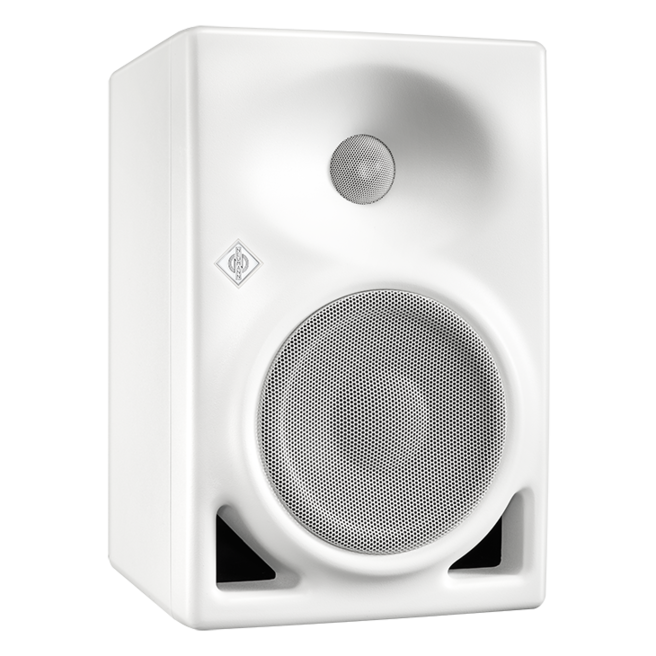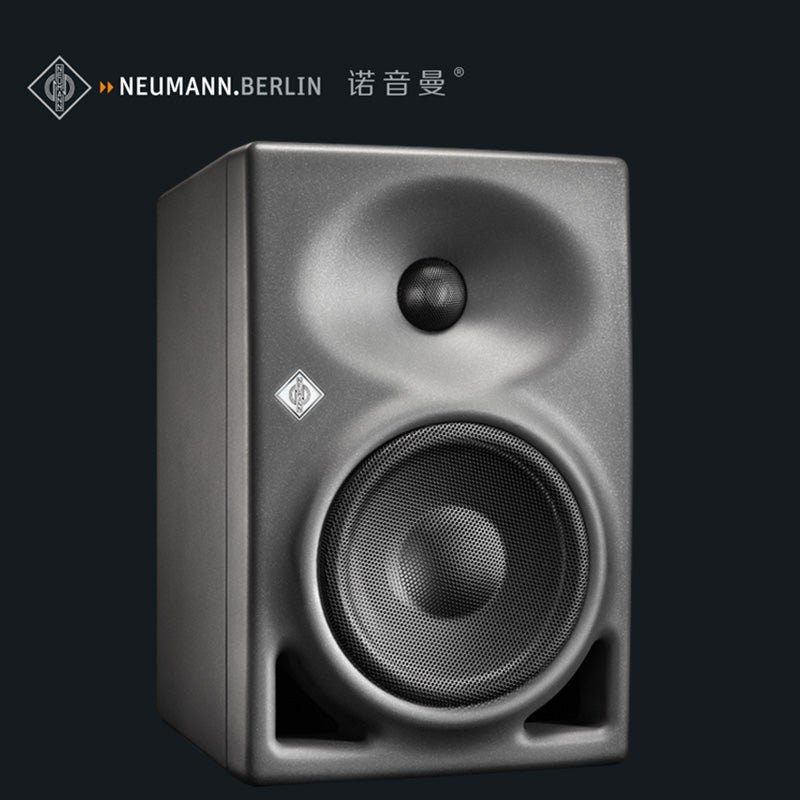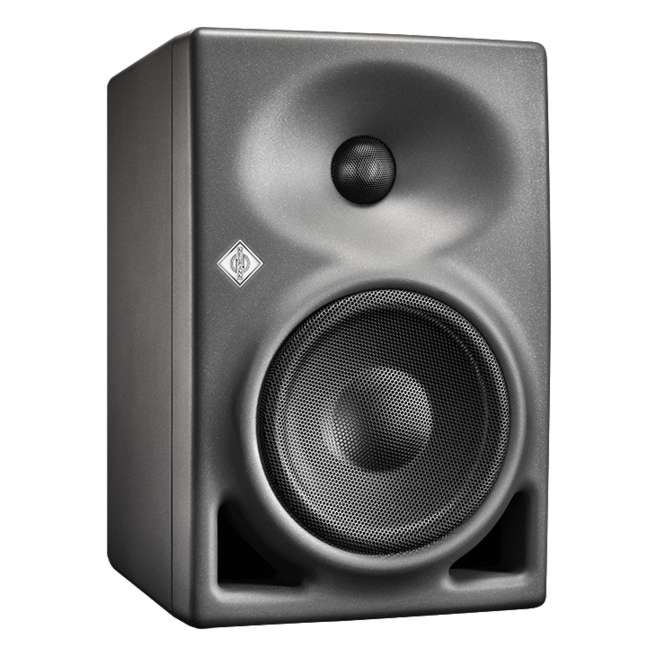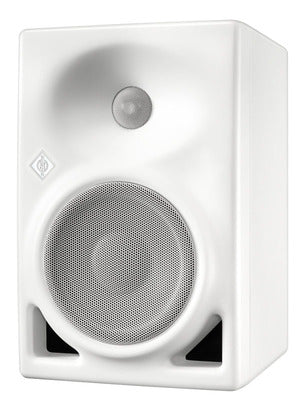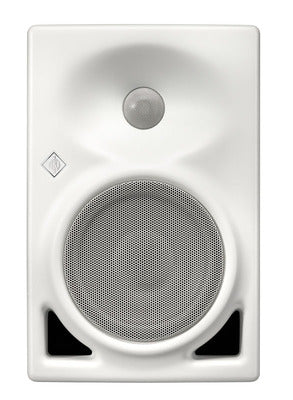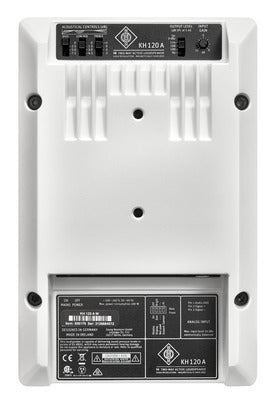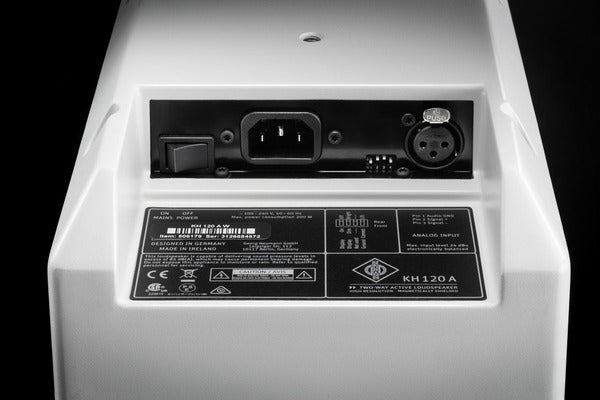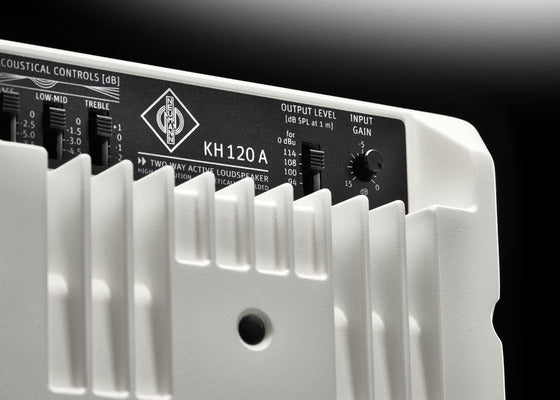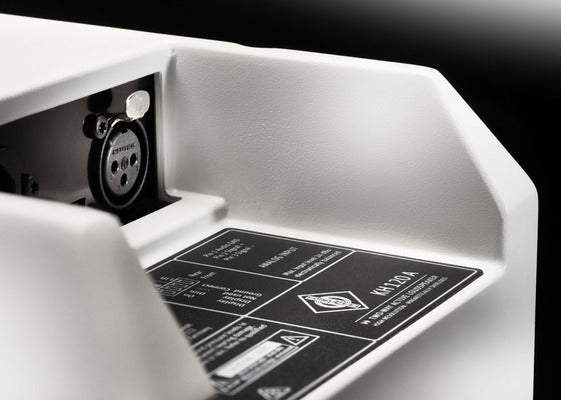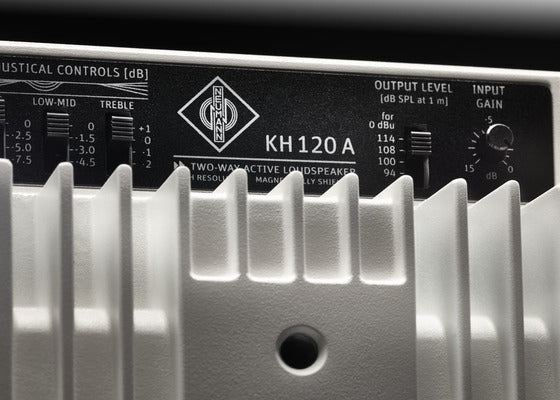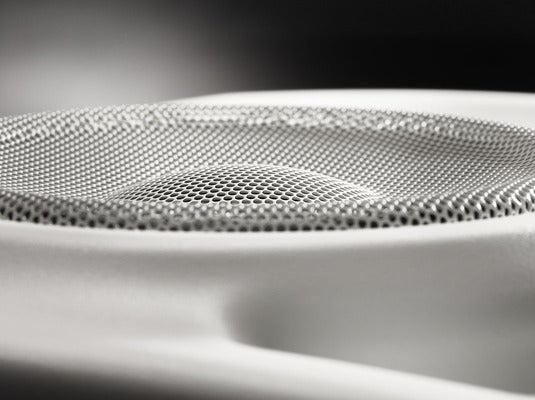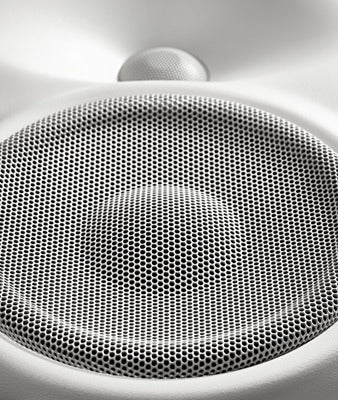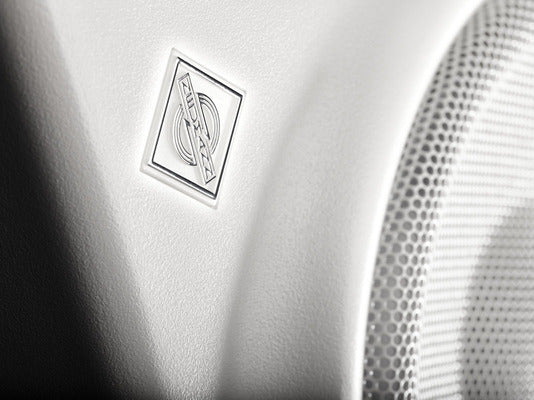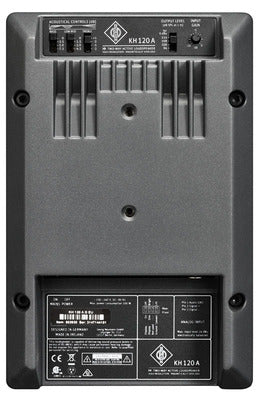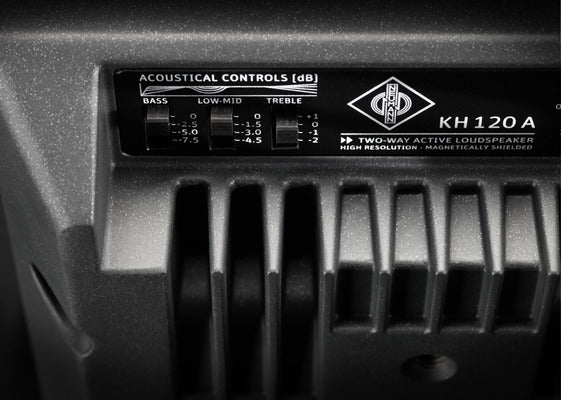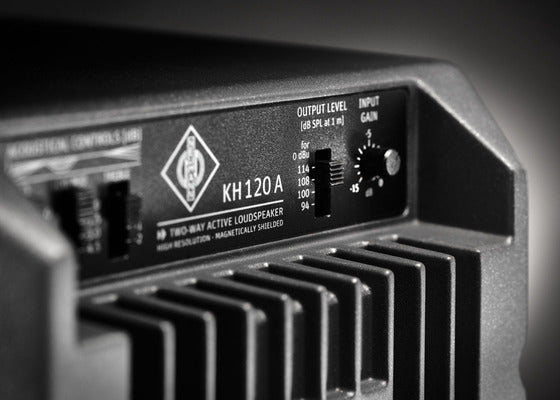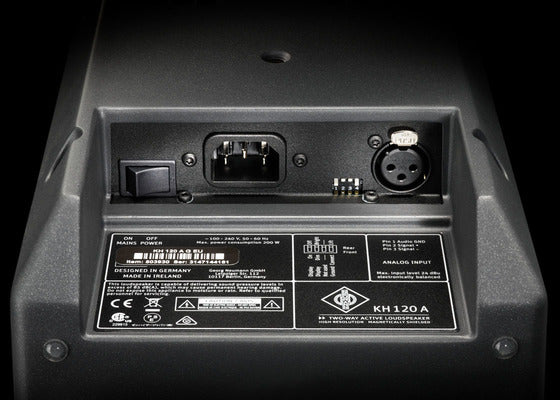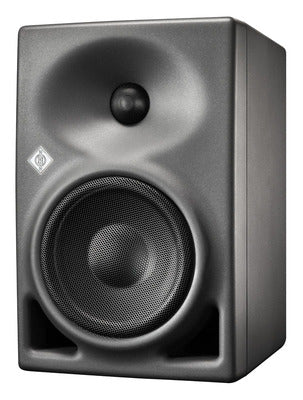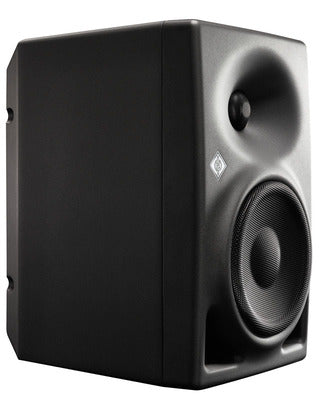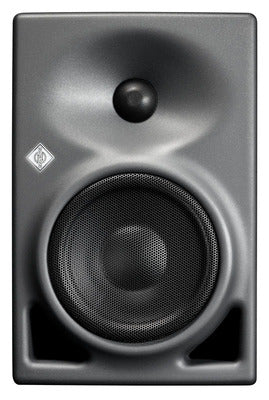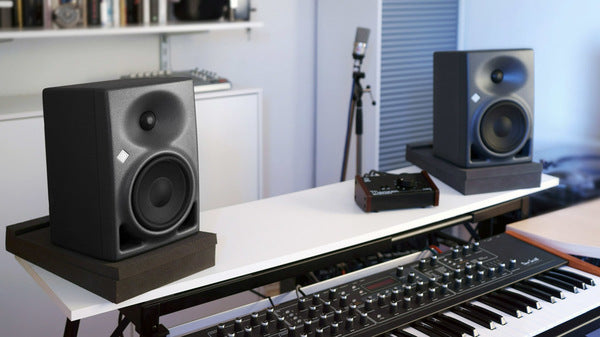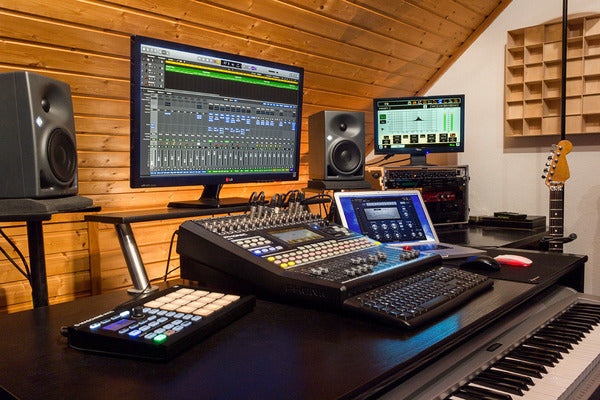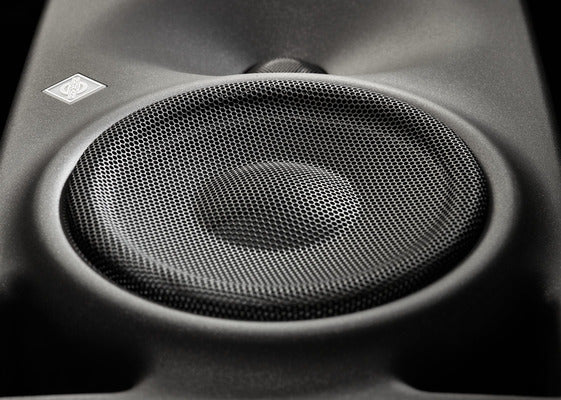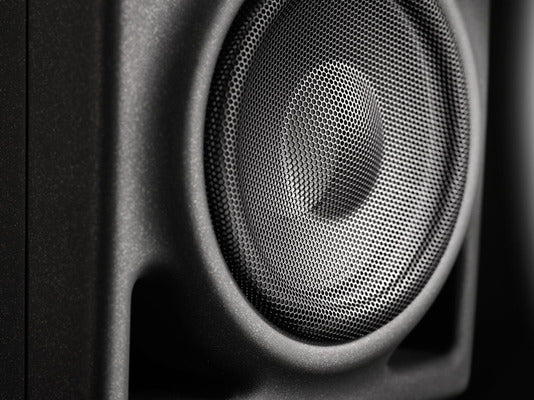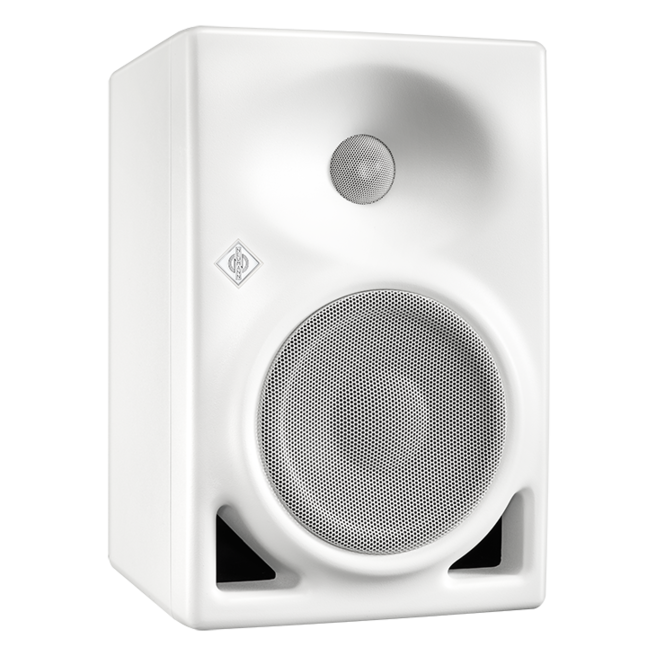
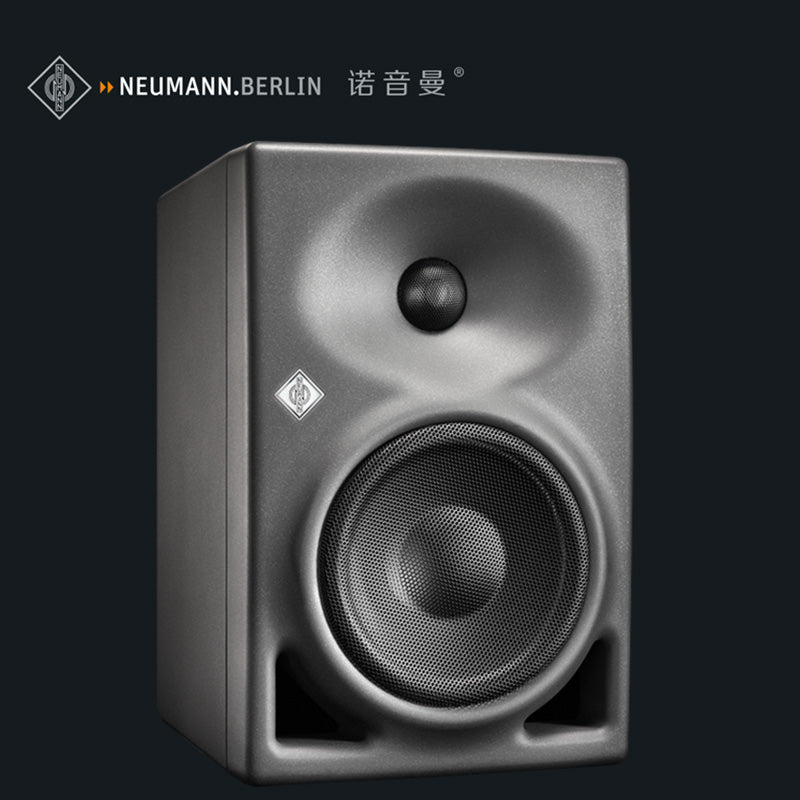
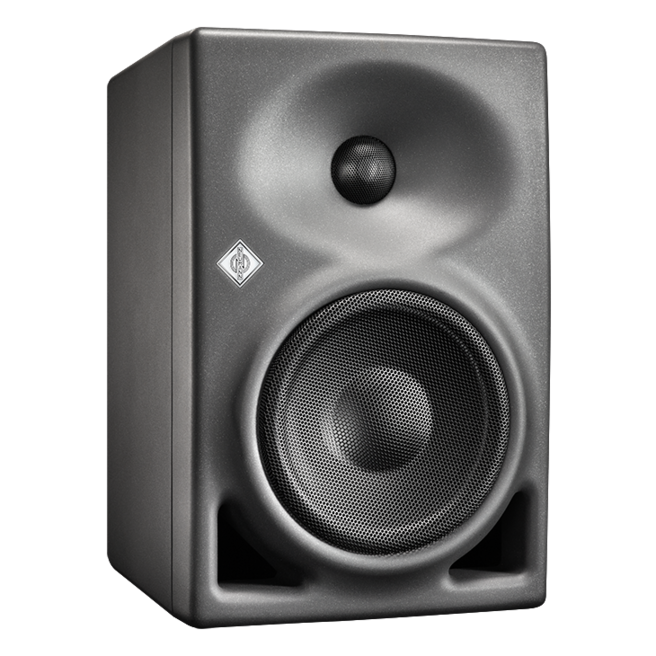
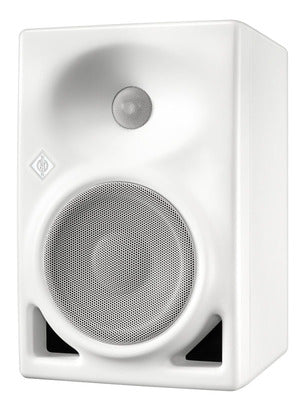
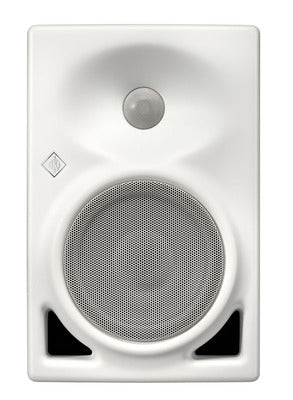
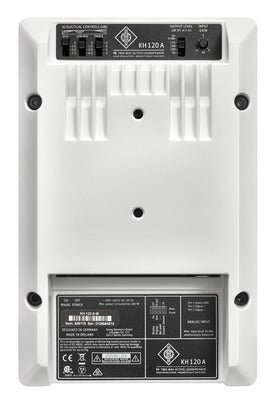
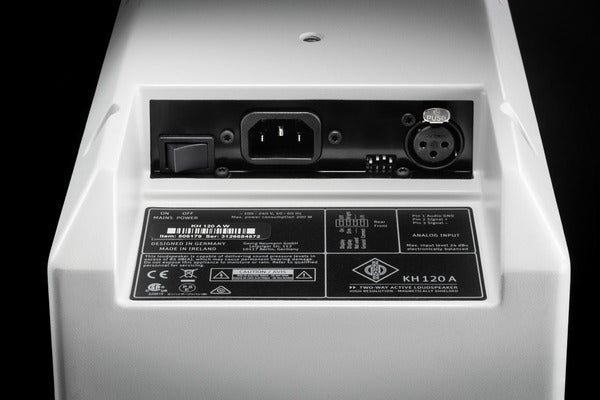
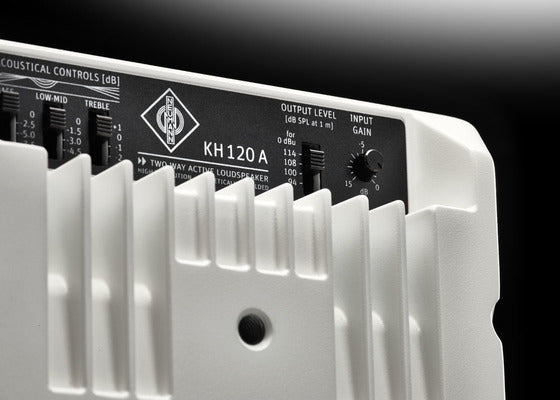
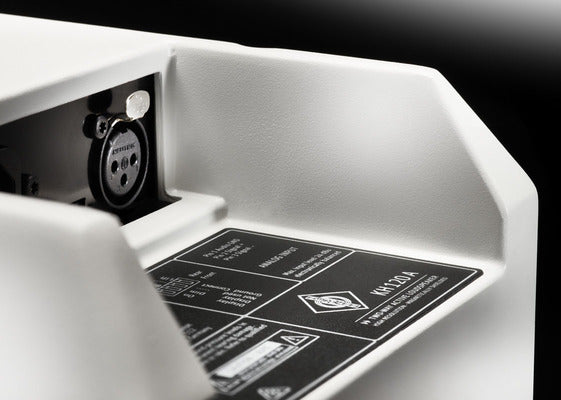
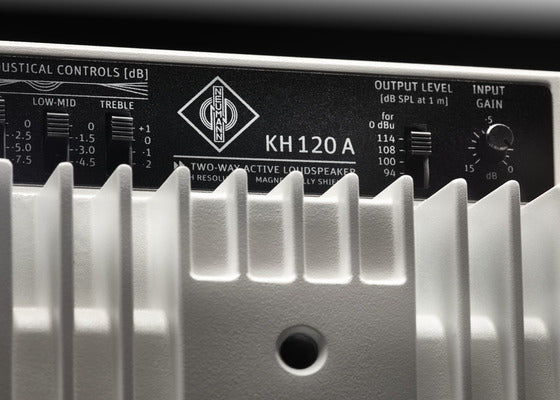
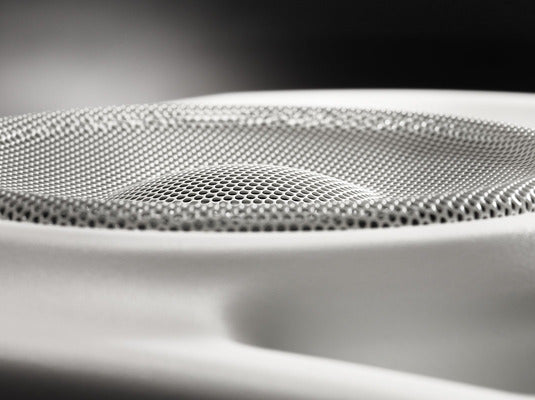
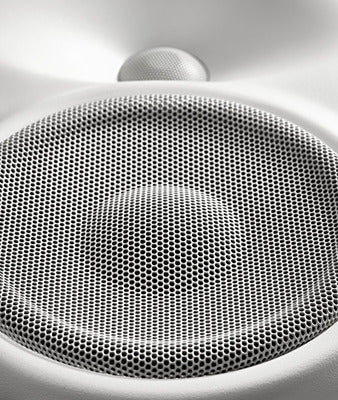
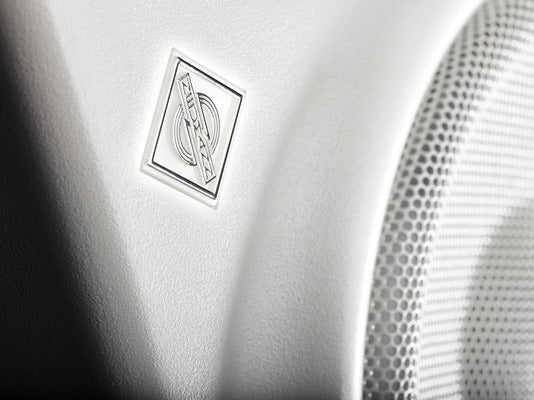
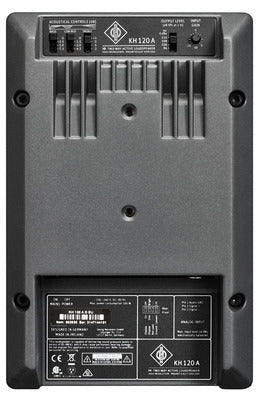
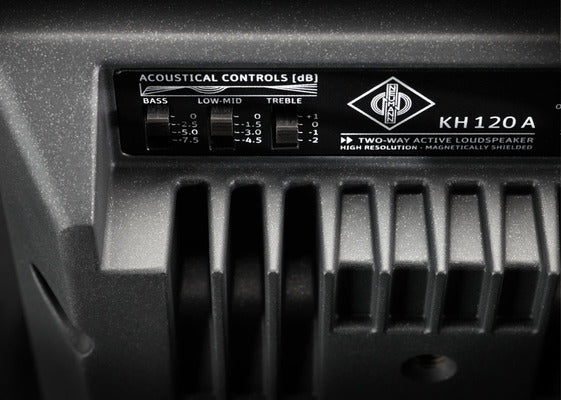
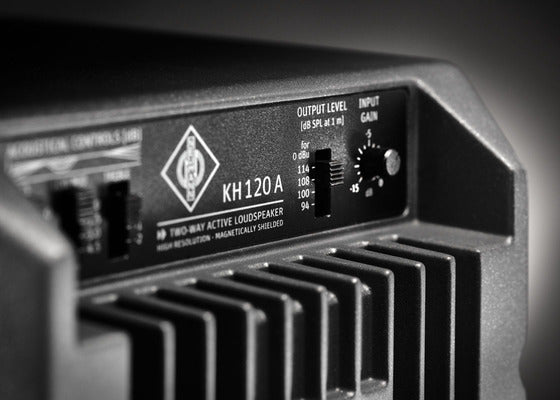
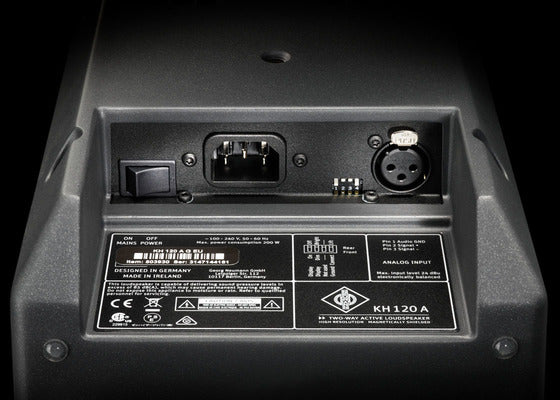
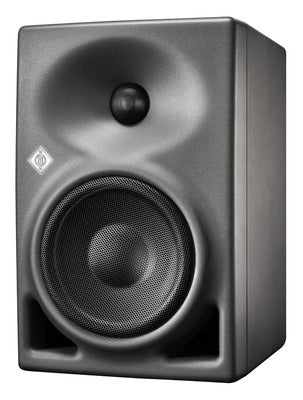
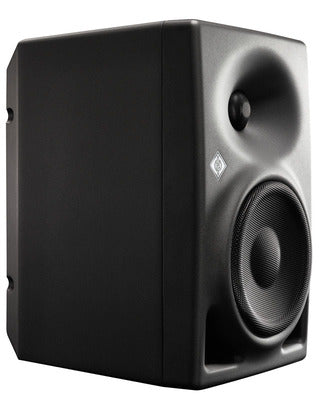
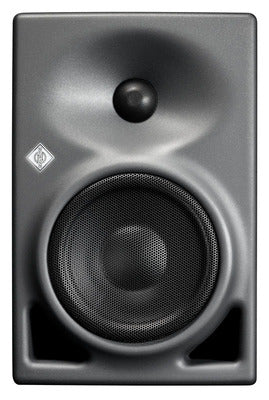
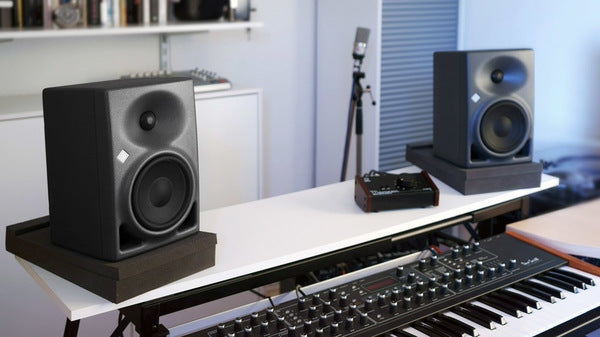
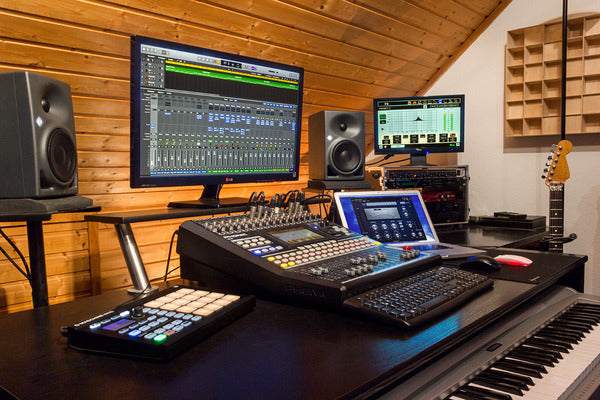
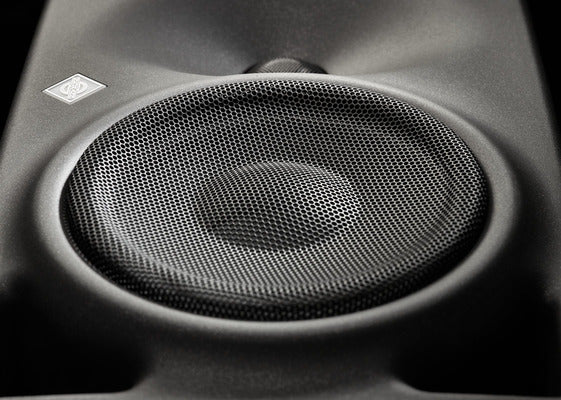
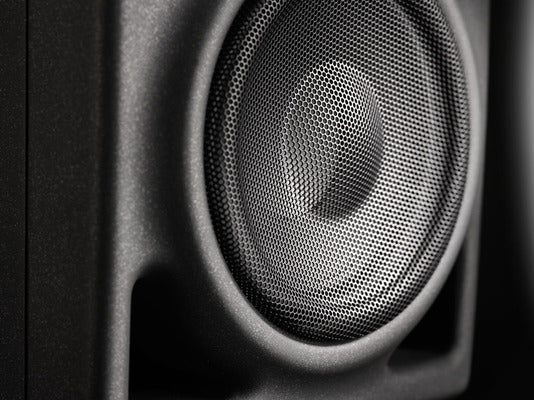
Collapsible content
Description
Precision redefined
The KH 120 is Neumann's trailblazer model and development yardstick for compact studio monitors. It has been a reference class for close-range monitoring since 2011. Enormous power reserves meet high-precision sound conduction. The result: Maximum signal fidelity and distinctly contoured transients across the entire, neutrally designed frequency response. This enables you to precisely control tonal depth, spatial image and even the smallest details in the mix.
The KH 120 is a two-way bi-amplified monitor with thermally protected class-AB amplifiers (80 W each). Just like the drivers, its Mathematically Modeled Dispersion™ (MMD™) waveguide is calculated with an optimal level of precision. Sound distributed in a horizontally precise manner ensures flexibility in the listening position; the narrower vertical dispersion reduces the negative effects of nearby reflections – for example from a desk or mixing console. The finely controlled dispersion characteristics optimize reproduction in even the most varied of room configurations.
Best working environment: Close to professional ears
The KH 120 is typically used in near-field applications such as project, music, broadcast and post-production studios for recording, mixing and mastering. It it also available as a digital input “D” version.
Ports and high dynamics: No longer a contradiction
With its digital switched-mode power supply and bi-amplification, the KH 120 realizes sound pressure of up to 111.1 dB and in doing so, retains a high-resolution and neutral representation across the entire frequency response. This provides sufficient energy for maximum dynamics without distortion and losses. As a result, the bass goes down to impressive 52 Hz. Despite using ports, there is no “overhang” in the bass response. The transient response remains well in control. The optimized design of the drivers delivers clean sound right down to the lowest parts of the 50 Hz region. This rich foundation offers enough room to work cleanly on the mix without the necessity for a supplementary subwoofer. In the demanding treble range, the specially developed, powerful alloy fabric dome ensures distortion-free reproduction.
The perfect complement:
The KH 750 DSP subwoofer In addition to its outstanding acoustic properties this subwoofer offers functions for non DSP-based Neumann monitors connected (analog) to its outputs regarding the interplay with the following tools:
- Automatic Monitor Alignment – Automatic room correction of stereo systems using the Neumann MA 1 measurement microphone (software for Mac/PC)
- Neumann.Control – Free iPad®-App for setup, operation, and room correction of stereo systems via guided and/or manual alignment
Hundreds of good reasons from the Neumann philosophy
The KH 120 has been developed true to the Neumann philosophy for monitor loudspeakers. Every component, every shape, every signal and every wave motion is a consequence of this philosophy. No form or component is there without reason. There are hundreds of tangible reasons built into the KH 120, which all stand for exceptionally pure and neutral sound. These include, for example, curvatures of the housing that reduce edge diffraction. Also included is the pistonic output of the bass driver which does not give rise to harmonic distortions, even with the highest sound peaks. Some of these reasons are obvious in the KH 120. Others Neumann prefers to keep to itself. But together, each can be heard – sound professionals in both large and small studios all around the world can testify to this. You can read more about the Neumann philosophy for studio monitors here.

(1) In-house simulated tweeter with alloy fabric dome
- Latest modeling techniques used to minimize non-linear (harmonic and intermodulation) distortion
- Low-distortion high frequency reproduction
(2) Elliptical Mathematically Modelled Dispersion™ (MMD™) waveguide
- Smoother off -axis response
- More forgiving of diverse acoustical environments
Wide horizontal dispersion
- Freedom of movement across the mixing console
Narrow vertical dispersion
- Reduces reflections off the mixing console
(3) Two-color + dimmable Neumann logo
- Displays operation status and activation of the extensive protection system
- Dimmable for low lighting level conditions or behind the screen applications
(4) In-house modelled long-throw composite sandwich cone bass driver with Extremely Linear Force Factor™ (ELFF™), magnetic shielding and flow optimized die cast basket
- Damping of break up modes brings low distortion at high sound levels
- Linear pistonic motor gives a very low harmonic distortion even at high excursions
- Reduced air noise and improved rocking modes
(5) Robust metal grilles
- Protects against mechanical damage
(6) Large high-capacity flow-optimized bass reflex ports with pipe resonance damping
- Fast bass transient response
- Reduced bass compression at high output levels
- No coloration from organ pipe resonance
- Easier to mount in tight spaces
(7) Compact aluminum cabinet
- Robust package for a long life
- No standing wave resonances
- Excellent heat dissipation
One-piece front panel with no discontinuities
- Reduced diffraction and smoother frequency response
(8) 4-position bass, low-mid and treble acoustical controls
- More control in diverse acoustical environments
- Fast acoustical set up in mobile applications
- Repeatable settings after moving loudspeakers
(9) Wide range input gain and output level controls
- Easier interfacing with signal sources
(10) Fully documented extensive mounting hardware range
- More flexibility in more diverse locations and backwards compatible to previous products
- Easy advanced planning for installations
(11) Display dimmer and ground lift
- For low lighting level conditions or behind the screen applications
- Reduced noise in electrically noisy environments and over-comes ground loops
(12) Universal switched-mode power supply (100 … 240 V)
- One version works in any country and robust to poor quality mains supply
(13) XLR electronically balanced analogue input
- Standard interfacing to professional equipment
##More Features
Production consistency due to individual hand alignment in final testing
- Any KH 120 is “pair matched” to any other KH 120
Separate fast acting thermo limiters for woofer and tweeter to protect the voice coils and power amplifiers
- Woofer soft clip and excursion limiters
- Increases system reliability
- Allows extraction of the maximum performance
Powerful amplifiers with large headroom and overheat limiting
- Improved transient response
- Assured reliability and safety
Data and Diagrams
| Free field frequency response ±6 dB | 46 Hz … 24 kHz |
|---|---|
| Free field frequency response ±3 dB | 52 Hz … 21 kHz |
| Free field frequency linearity deviation between 100 Hz and 10 kHz | ± 1.0 dB |
| Self-generated noise at 10 cm (with input gain set to 100 dB SPL for 0 dBu) | <20 dB(A) SPL |
| Sine wave output with a THD < 0.5 % at 1 m in half space | 95 dB SPL (>120 Hz) |
| Max. SPL calc. in half space at 3% THD at 1m (averaged between 100 Hz and 6 kHz) | 111.1 dB SPL |
| Max. SPL in full space at 3% THD at 1m (averaged between 100 Hz and 6 kHz) | 105.1 dB SPL |
| Bass capability: Max. SPL in half space at 3% THD at 1m (averaged between 50 Hz and 100 Hz) | 104.8 dB SPL |
| Max. short term SPL with IEC-weighted noise (IEC 60268-5) at 1 m, in typical listening conditions | 107 dB(C) SPL |
| Reproduction accuracy between 100 Hz and 10 kHz: 100%, 80%, 50% of loudspeakers produced | ±0.97; ±0.40; ±0.23 dB |
| Max. short term SPL with music material at 2.3 m in typical listening conditions (pair / full range) | 97 dB(C) SPL |
| Max. short term SPL with music material at 2.3 m, in typical listening conditions (pair with subwoofer) | 104 dB(C) SPL |
| Max. long term SPL with pink noise at 2.3 m, in typical listening conditions (single / pair full range) | 88 / 93 dB(C) SPL |
| Max. long term SPL with pink noise at 2.3 m, in typical listening conditions (single / pair with subwoofer) | 89 / 94 dB(C) SPL |
| Display Brightness | White:on/dimmed/off; Red:on/dimmed |
| Bass Extension (Hz, -6 dB) | 46 |
| Maximum output level (dB SPL) | 111.1 |
| Max. Listening Distance up to (m) | 4 |
| Analog input(s) | XLR: analog electronically balanced |
| Analog input impedance | 10k Ohms in position 94/108 dB SPL at 1 m; 20k Ohms in position 100/114 dB SPL at 1 m |
| Max. input level | +24 dBu |
| Common mode rejection ratio (CMRR) | >56 dB @ 15kHz |
| Input gain control (sensitivity) | 0 dB ... -15 dB |
| Output level control (output level in 1 m based on 0 dBu input level) | 94; 100; 108; 114 dB SPL |
| Equalization: Bass | 0; -2.5; -5; -7.5 dB |
| Equalization: Low-Mid | 0; -1,5; -3; -4,5 dB |
| Equalization: Treble | +1; 0; -1; -2 dB |
| Controller design | Analog; active |
| Crossover frequency | 2.0 kHz |
| Crossover slope | 24 dB/oct; 4th order |
| Protection circuitry | Independent thermo limiters for woofer, tweeter. Woofer soft clip and excursion limiters. Amplifier overheat. |
| Infrasonic filter: frequency; slope | 30 Hz; 6 dB/oct. |
| Display: On; Normal Operation | Neumann logo “White” |
| Display: Limit / Clip / Errors / Protection /Boot Mute / Shut Down Mute | Neumann logo “Red” |
| Output power woofer amplifier (THD+N with limiter deactivated: 10%) | 80 W |
| Output power tweeter amplifier (THD+N with limiter deactivated: 10%) | 80 W |
| Output power woofer amplifier (THD+N with limiter deactivated: 0.1%) | 50 W |
| Output power tweeter amplifier (THD+N with limiter deactivated: 0.1%) | 50 W |
| Mains Power Supply: input voltage; frequency | 100-240V; 50/60 Hz |
| Power consumption (230 V / 100 V): Idle | 20 W |
| Power consumption (230 V / 100 V): Full output | 200 W |
| In-rush current (Peak) | 20 A |
| Cabinet material | Aluminium |
| Cabinet surface finish; color (front / back) | Powder-coated, White (RAL 9016) |
| Operating conditions | +10° C to +40° C (+50° F to +104° F); <75% RH; non-condensing |
| Transport/storage conditions | -25° C to +70° C (-13° F to 158° F); <90% RH, non-condensing |
| Woofer | 130 mm (5.25") magnetically shielded with protecting black metal grille |
| Tweeter | 25 mm (1") with protecting black metal grille |
| Mounting points | 2 x M8 threaded inserts with 70 mm spacing on back panel; thread depth 15 mm (5/8”) |
| Product dimensions (height x width x depth) | 277 x 182 x 220 mm (10 7/8” x 7 1/8” x 8 5/8”) |
| External net volume | 9.7 liters |
| Packed dimensions (height x width x depth), mm (inches) | 415 x 365 x 280 mm (16 3/8” x 14 3/8” x 11”) |
Diagrams
KH 120 - Group Delay

KH 120 - Free-Field Response

KH 120 - Maximum SPL at 1m (Red: 3% THD, Blue: 1% THD)

KH 120 - Vertical Directivity Plot

KH 120 - Cumulative Spectral Decay

KH 120 - Bass, Low-Mid and Treble Acoustical Controls

KH 120 - Harmonic Distortion at 90 dB SPL (Purple: THD, Red: 2nd harmonic, Green: 3rd harmonic)

KH 120 - Horizontal Directivity Plot


